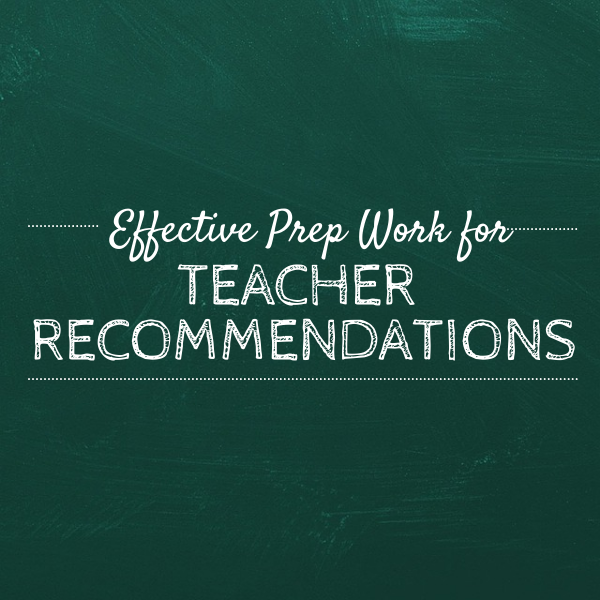There are over 1,700 reasons why it’s important to secure strong teacher recommendations for your college application. How did we come up with such a large figure? Well, that’s the current number of colleges and universities that are test-optional or test blind.
Teacher recommendations have always been an important element of a college application, but with so many schools changing their testing policies in response to the pandemic and seeing record numbers of applications as a result, recommendation letters are more important than ever! Yes, even for students who plan to submit test scores! Letters provide admissions committees with important insights into your academic performance, as well as your personal qualities and overall attitude. A well-written recommendation will tell a story that your GPA (and scores) cannot.
So how do you secure a strong teacher recommendation? After all, you can’t control what a teacher writes about you. Or can you? There are actually specific steps a student can take to ensure two (sometimes three) quality recommendation letters, even in the age of online learning and hybrid classes.
1. Be Present
Be present. Sounds easy, right? But we’re not just talking about being physically present in the classroom or via Zoom. One of the best ways to ensure strong recommendations is to be an active and engaged student. Participate in discussions and ask questions. This will show your teacher that you’re curious, you take initiative, and you do your work. Pitch in when it comes time for group projects, and don’t be afraid to take the lead when there’s an opportunity. If you’re struggling, reach out for help. And if you’re doing well, reach out anyway. You can strike up a conversation about the topics that interest you most in the class.
Being present is a habit you’ll want to establish early in your high school career. However, if you haven’t been as engaged as you’d like–perhaps because of the pandemic or shyness or a lack of confidence–you can start now. Make one conscious effort per day to engage, whether it’s raising your hand or staying after class to ask a question.
2. Build Connections
Investing in your classes is important, but so is creating connections and relationships within your school community. It’s much easier for you to request a recommendation if you feel comfortable with the teacher, and it’s much easier for them to write the letter if they have a connection with you.
We know that it can be challenging for some students to get to know their teachers, but there are plenty of small actions you can take. Say hello when you pass by teachers, and don’t be afraid to ask how they are doing. Visit teachers during their office hours or study halls, and consider coming to class a few minutes early. This is a great opportunity to strike up conversation and discover shared interests, like sports or music. You can also join an extracurricular activity they are leading (but only if you’re actually interested in the activity). If you’re in an online or hybrid setting that limits your interactions with teachers, make use of Zoom chat boxes, email, and other forms of digital connection. Trust us, they will be thrilled to see you making the effort to become more than just a face behind the screen.
3. Choose Recommenders Wisely
Before you start asking for recommendations, take some time to strategize. It’s not as simple as choosing your favorite teacher or the one who gave you the best grade. Think about teachers who can speak to your strengths, as well as your growth over time. It’s also important to pick recommenders who will offer different perspectives about your performance and qualities. Otherwise, you’ll end up with two repetitive letters.
Subject matter is also a consideration. Ideally, one of your recommenders should connect to your area of interest. For example, if you’re applying as a business major, consider asking your math teacher to write one of your letters.
Finally, do your best to pick current teachers who can reflect on who you are right now. As much as you might have loved your ninth grade history teacher, you’ve matured a lot (both academically and personally) since then. We highly recommend trying to secure letters from junior year teachers. If this is truly not possible, it is okay to have a letter of recommendation from a sophomore year teacher that you will also have as a senior. Remember: sophomore year seems recent now, when it’s February of junior year, but the colleges will be reading these letters an entire year later! At that point, sophomore year is ancient history and your choice will raise a red flag about your relationships with junior year teachers.
4. Ask early…and politely give an out. Back off at the first sign of hesitation!
Be sure to secure your recommenders early, so your teacher has plenty of time to write a quality letter. We highly suggest asking for recommendations before the end of your junior year - after spring break is a great time. Many teachers limit the number of letters they write, so you want to make sure you secure a spot before the crowd rushes in during the fall semester of your senior year.
Don’t just assume that a teacher will agree to write you a recommendation. Formally ask them, and in person if possible. We recommend using the wording: “Do you think you know me well enough to write me a supportive letter of recommendation?” This gives the teacher an out. If the teacher is in any way hesitant, they can decline with the excuse that they don’t know you well enough, and everyone can save face.
If there is any sign of hesitation at all, immediately abort the mission and find a new teacher! And certainly, never, ever argue with a teacher about this. Honestly, the kindest thing a teacher can do for a student is to show hesitation or decline to write a letter. This person is telling you in so many words that they are unable to write you a great letter … listen to that feedback! No letter is much better than a mediocre letter, which is basically the kiss of death to any college application.
5. Create a highlight reel
Regardless of how well your teacher knows you, they don’t know EVERYTHING. That’s why it’s extremely helpful to create a ‘highlight reel.’ Provide your recommender with information about your personal strengths, achievements, and interests. Of course you’ll want to share highlights about your performance in their class, and the more specific you can be, the better!
Jog their memory about the cool project you spent months researching; the really challenging science labs you mastered; or the improvements you made to your study habits. And if the subject relates to your career interests or intended major, let your teacher know! It’s also a good idea to share your related involvements outside of the classroom, so your teacher has the ‘full picture’ and can speak to your contributions in other areas of school life that may relate to their subject matter.
HOW WE HELP STUDENTS SECURE STRONG TEACHER RECOMMENDATIONS
As part of our college counseling services, we work closely with students to develop a strategy for teacher recommendations and set specific goals well before it’s time to actually ask the teachers. We check in on the teacher recommendation strategy throughout the year, and ultimately help students create ‘highlight reel’ narratives for each teacher through a multi-step process that begins with our customized questionnaires.
If you would like to learn more about our services or schedule a session, please visit our website.











